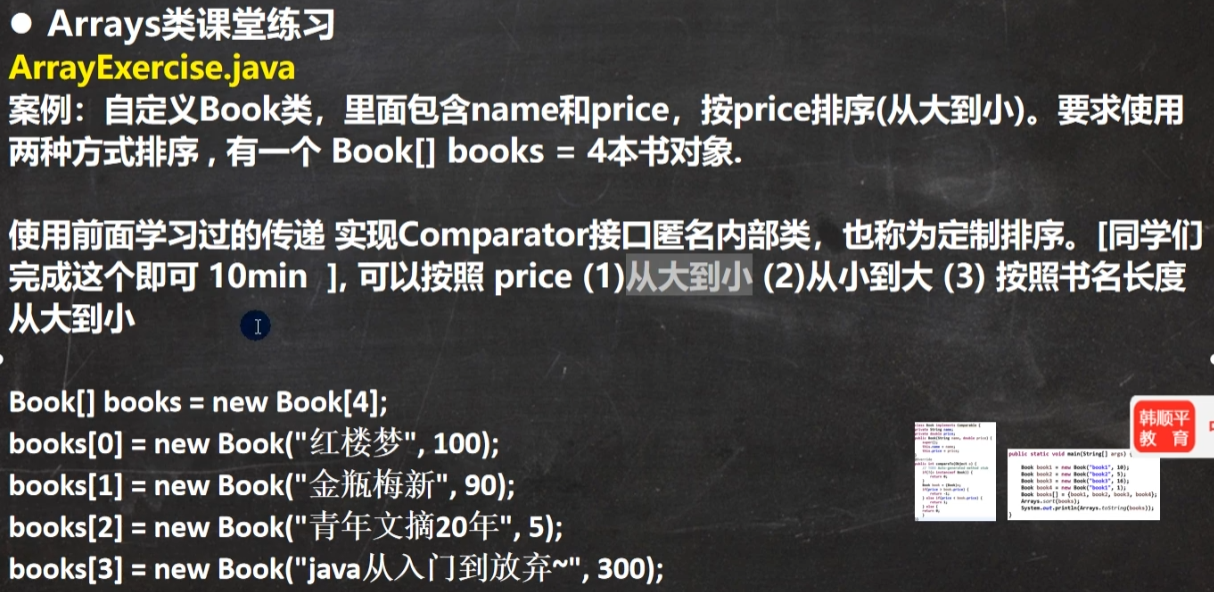一:Arrays类常见方法应用举例
1:toString( ) 返回数组的字符串形式
public class Test00 { public static void main(String[] args) { Integer[] integers = {1,5,7,8}; //遍历数组 ,返回的是字符串形式 System.out.println(Arrays.toString(integers)); }}
2:sort( ) 排序(自然排序和定制排序)
<1>自然排序
public class Test00 { public static void main(String[] args) { Integer[] Arr2 = {5,9,1,4,7}; Arrays.sort(Arr2); System.out.println("--------排序完成----------"); System.out.println(Arrays.toString(Arr2)); }}
<2>定制排序
public class Test00 { public static void main(String[] args) { Integer[] Arr2 = {5,9,1,4,7}; Arrays.sort(Arr2); Arrays.sort(Arr2, new Comparator<Integer>() { @Override public int compare(Integer o1, Integer o2) { return o2 - o1; } }); System.out.println(Arrays.toString(Arr2)); }}
<3>模拟排序
public class Test00 { public static void main(String[] args) { int[] Arr2 = {5,9,1,4,7}; bubble02(Arr2, new Comparator() { @Override public int compare(Object o1, Object o2) { int n1 = (Integer)o1; int n2 = (Integer)o2; return n2 - n1; } }); Systen.out.println("-------排序结果---------") System.out.println(Arrays.toString(Arr2)); } public static void bubble02(int[] arr, Comparator c) { int temp = 0; for (int i = 0; i < arr.length - 1; i++) { for (int j = 0; j < arr.length - 1 - i; j++) { //数组排序由 c.compare(arr[j], arr[j + 1])返回的值决定 if (c.compare(arr[j], arr[j + 1] ) > 0) { temp = arr[j]; arr[j] = arr[j + 1]; arr[j + 1] = temp; } } } }}
3:binarySearch( ) 通过二分搜索法进行查找
public class Test00 { public static void main(String[] args) { Integer[] integers = {1,5,7,8}; //1:要求该数组是有序的. 如果该数组是无序的,不能使用 binarySearch //2:如果数组中不存在该元素 // 就返回 return -(low + 1); // key not found. // (它应该在的位置的负数) System.out.println(Arrays.binarySearch(integers,8)); //3 System.out.println(Arrays.binarySearch(integers,9)); //-5 }}
4:copyOf 数组元素的复制 数组元素的复制
public class Test00 { public static void main(String[] args) { Integer[] Arr1 = {1,5,7,8}; //1. 从 arr 数组中,拷贝 arr.length 个元素到 newArr 数组中 //2. 如果拷贝的长度 > arr.length 就在新数组的后面 增加 null //3. 如果拷贝长度 < 0 就抛出异常NegativeArraySizeException //4. 该方法的底层使用的是 System.arraycopy() Integer[] Arr2 = Arrays.copyOf(Arr1,4); System.out.println("-----拷贝执行完毕-------"); System.out.println(Arrays.toString(Arr2)); }}
5:fill( ) 数组元素的填充
public class Test00 { public static void main(String[] args) { Integer[] Arr2 = {1,5,7,8}; ///1. 使用 99 去填充 num数组,可以理解成是替换原理的元素 Arrays.fill(Arr2,10); System.out.println(Arrays.toString(Arr2)); }}
6:alist( ) 将一组值转换为list
public class Test00 { public static void main(String[] args) { Integer[] Arr2 = {1,5,7,8}; //1. asList 方法,会将 (2,3,4,5,6,1)数据转成一个 List 集合 //2. 返回的 asList 编译类型 List(接口) //3. asList 运行类型 java.util.Arrays#ArrayList, // 是Arrays 类的静态内部类 List asList = Arrays.asList(2,3,4,5,6,1); System.out.println("asList=" + asList); }}
二:Arrays类课堂练习

package Date0901.Test01;import java.util.Comparator;/** * 作者:sakura * 日期:2022年09月02日 00:53 */public class Test00 { public static void main(String[] args) { Book[] books = new Book[4]; books[0] = new Book("红楼梦", 100); books[1] = new Book("金瓶梅新", 90); books[2] = new Book("青年文摘20年", 5); books[3] = new Book("java从入门到放弃~",300); Pricesort(books, new Comparator() { @Override public int compare(Object o1, Object o2) { int n1 = (int)o1; int n2 = (int)o2; return n2 -n1; } }); Namesort(books, new Comparator() { @Override public int compare(Object o1, Object o2) { int n1 = (int)o1; int n2 = (int)o2; return n2 -n1; } }); System.out.println("--------排序结果--------"); for (int i = 0; i < books.length; i++) { System.out.println(books[i].toString());; } } public static void Pricesort(Book[] book, Comparator C) { Book temp ; for (int i = 0; i < book.length; i++) { for (int j = 0; j < book.length -i-1 ; j++) { if ( (C.compare(book[j].getPrice(),book[j+1].getPrice())) >0){ temp = book[j]; book[j] = book[j + 1]; book[j+1] = temp; } } } } public static void Namesort(Book[] books,Comparator C){ Book temp; for (int i = 0; i < books.length; i++) { for (int j = 0; j < books.length-i-1; j++) { if ( (C.compare(books[j].getName().length(),books[j+1].getName().length())) >0){ temp = books[j]; books[j] = books[j + 1]; books[j+1] = temp; } } } }}class Book { private String name; private int price; public Book(String name, int price) { this.name = name; this.price = price; } public String getName() { return name; } public void setName(String name) { this.name = name; } public int getPrice() { return price; } public void setPrice(int price) { this.price = price; } @Override public String toString() { return "Book{" + "name='" + name + '\'' + ", price=" + price + '}'; }}


